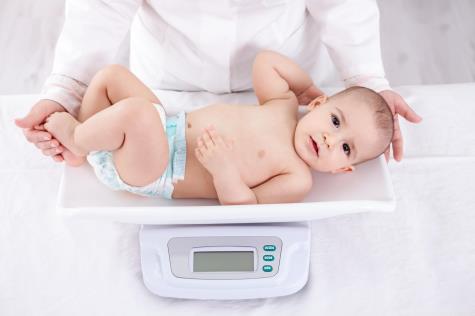Tracking your baby's growth
Your baby didn't come with an instruction manual, sadly – but there is the Red Book! The Personal Child Health Record (PCHR) tracks your baby’s growth and measurements from birth to five. Here’s what to expect.
At a glance
- In the first few weeks there'll be a variety of checks to see how your baby is developing
- Throughout the first 4 months your baby will require vaccinations
- At 12 months your health visitor will perform a full review of development milestones

Exact timings on checks will vary depending on where you live in the UK. But this is roughly what you should expect in the way of checks for your baby in their first two years.
5-8 days
Heel-prick blood test to test for conditions including sickle cell, cystic fibrosis, hypothyroidism and rare genetic conditions.
10-14 days
A new baby review will be carried out by your health visitor and they'll help you with becoming a parent and offer advice on how to keep your baby safe and healthy. It's also a good time to get help with anything you want, including breastfeeding.
First month
Hearing test - a lot of your baby's hearing will have developed in the womb, and by the time they're 9 weeks old, it will be fully developed. This check in the first month will test their hearing development.
6-8 weeks
A full physical examination of your baby, carried out by a GP or health visitor. They will check your baby’s weight, length and head circumference, their hearing and eyes (do they watch your face and follow you?), hip movement and general health. They’ll also check how feeding is going. You will have a health visitor appointment in this time frame.
8, 12 and 16 weeks
Throughout the first 4 months your baby will require vaccinations to keep them healthy and immunised from a range of illnesses and diseases.
By 12 months
A nursery nurse or support worker from the health visiting team will perform a full health review. They will check for development milestones: crawling/walking, language, motor skills, and feeding. They may also weigh and measure your baby.
12-13 months
At around the year mark your baby will be due another round of vaccinations, including his first MMR (Measles, Mumps, Rubella)
2-2.5 years
At around the age of 2 you'll have another health review where you'll be encouraged to talk about your child's development and any concerns you may be having. They will help you to review general development including movement, speed, hearing and vision, along with behaviour and social skills.
Weighing and measuring your baby
While you’re establishing feeding in the early weeks, your baby will be weighed regularly to check they've regained their birth weight (this can take up to three weeks).
But after that, health visitors are much less interested in a baby’s weight than they used to be 20 years ago when you took your baby to the clinic for their weekly weigh-in. As long as your baby looks healthy, is feeding happily and seems to be growing well there’s no need to have them weighed so often.
After the first few weeks, they’ll be weighed:
- no more than once a month until they're six months old.
- no more than once every two months from 6-12 months.
- no more than once every three months over the age of one.
Your baby’s length is likely to be measured at the 6-8 week review and their 12 month review. At aged two their height will be measured standing up.
The Red Book
All the results of your baby’s growth checks and immunisations will be recorded in the Personal Child Health Record or Red Book. In some areas of the UK, this is also available online as an eRed book.
That will make it easier to track there growth over the first two years, so you can be reassured your little one is progressing well.
You’ll be able to plot their height, weight and head circumference on growth charts and see which ‘centile’ they are on. This is just a way of comparing them to other children their age. So if they’re on the 25th centile for weight it means that out of 100 children yours is the 25th lightest – 75 are heavier.
It’s perfectly normal for a child to drop or jump one centile, but it’s unusual to drop two. Talk to your health visitor if you’re concerned about your child’s growth.